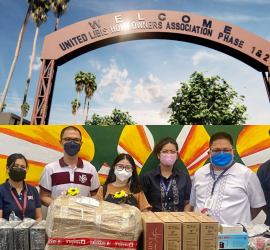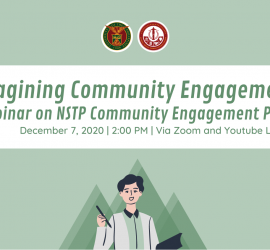HELPING A GROWING COMMUNITY Over the past 36 years, Sitio Libis in Valenzuela City was once an informal settlers community. The community did not have legal rights to build structures and buildings till the Land Acquisition Project in 2010. Now, Sitio Libis can finally build structures that will help with the development of its community. In partnership with the Technical Assistance Movement for People and Environment, Inc. (TAMPEI), the CTWS class under the College of Architecture (COA) helped with the design of the boundary arch of Sitio Libis as a marker for the community. The Sitio Libis community thanked the CWTS class for their efforts, as the boundary arch symbolizes their growing community. PROJECT KATARUNGAN Project Katarungan was an initiative by the NSTP-College of Social Sciences & Philosophy (CSSP) to assist the persons deprived of liberty or PDL with their online hearings and online classes by contributing laptops and other devices. Last June 21, the NSTP classes: CWTS 2 CSSP MJKL (Prof. Daniel Mabazza), CWTS 2 CSSP MKLN1 (Asst. Prof. Jairus Diesta Espiritu), and CWTS 2 CSSP MXY (Asst. Prof. Marielle Marcaida) turned over four sets of computers (with tables and chairs) to Tanglaw Pag-asa, Bulacan’s youth rehabilitation center. As a token of appreciation, they were given flower pens hand-made by their youth. NSTP-CSSP Coordinator, Asst. Prof. Jairus Espiritu, shared the activity in his FB account and expressed his thoughts in teaching NSTP. Asst. Prof. Espiritu said “teaching NSTP reminded me of our shared humanity–how all of us are in need of each other’s help. And I do think it is from this shared humanity that our civic duties arise. We are responsible for one another because we are in each other.” By Ma. Regina Valerio
community engagement
A sequel webinar to National Service in the New Normal, Reimagining Community Engagement: A Webinar on NSTP Community Engagement Projects,was hosted by the NSTP Diliman Office last December 7, 2020 via Zoom and YouTube livestream. Featuring five resource speakers from public service and community development sectors, the free webinar aimed to provide participants with valuable training and insights essential for planning and implementing community engagement projects considering the restrictions posed by the pandemic. NSTP Diliman Director Dr. Jonalou Labor formally opened the event welcoming more than 1,000 NSTP implementers and students representing 180 higher education institutions (HEIs) in the country. Dr. Labor shared that UP Diliman, consistent with UP’s mandate to become a public service university, has provided knowledge products and instructional materials for NSTP Common Module and Component Courses Topics. He pointed out that these materials may be accessed through the NSTP Diliman YouTube Channel. He also encouraged the attendees to visit the NSTP Diliman website to access the Serbisyong Tatak UP radio episodes, also a source of reliable information on NSTP content. He reiterated that UP, as a national university, would continue to extend all the help that it could to NSTP implementing units around the country to provide the best NSTP program possible. After his opening remarks, Dr. Labor introduced Ms. Francelline Jimenez, a development worker and the Project Manager of Increasing the Resilience towards Natural Hazards (INCREASE) Project for CARE Philippines. In her talk about the Fundamentals of Remote and Blended Community Engagement, she defined remote and blended community engagement. She emphasized that with our current situation, using digital platforms in doing community engagement is inevitable and it is critical to know the purpose of our project and the context of the community we are engaging with in order to decide on the best type of platform to use. Mr. John Cedric Pineda, Program Manager for Community Engagement and Life Skills for Teach for the Philippines, the second speaker, discussed the Characteristics of Effective Remote and Blended Community Engagement. He enumerated three main factors that affect the success of remote and community engagement: accessibility, inclusivity, and relevance. At the end, he highlighted […]


